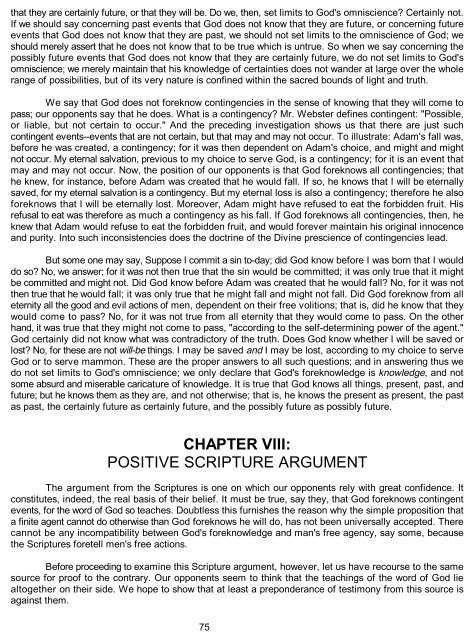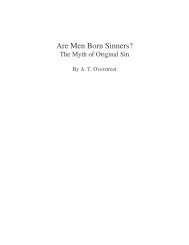Foreknowledge by Joel Hayes - Library of Theology
Foreknowledge by Joel Hayes - Library of Theology
Foreknowledge by Joel Hayes - Library of Theology
Create successful ePaper yourself
Turn your PDF publications into a flip-book with our unique Google optimized e-Paper software.
that they are certainly future, or that they will be. Do we, then, set limits to God's omniscience? Certainly not.<br />
If we should say concerning past events that God does not know that they are future, or concerning future<br />
events that God does not know that they are past, we should not set limits to the omniscience <strong>of</strong> God; we<br />
should merely assert that he does not know that to be true which is untrue. So when we say concerning the<br />
possibly future events that God does not know that they are certainly future, we do not set limits to God's<br />
omniscience; we merely maintain that his knowledge <strong>of</strong> certainties does not wander at large over the whole<br />
range <strong>of</strong> possibilities, but <strong>of</strong> its very nature is confined within the sacred bounds <strong>of</strong> light and truth.<br />
We say that God does not foreknow contingencies in the sense <strong>of</strong> knowing that they will come to<br />
pass; our opponents say that he does. What is a contingency? Mr. Webster defines contingent: "Possible,<br />
or liable, but not certain to occur." And the preceding investigation shows us that there are just such<br />
contingent events--events that are not certain, but that may and may not occur. To illustrate: Adam's fall was,<br />
before he was created, a contingency; for it was then dependent on Adam's choice, and might and might<br />
not occur. My eternal salvation, previous to my choice to serve God, is a contingency; for it is an event that<br />
may and may not occur. Now, the position <strong>of</strong> our opponents is that God foreknows all contingencies; that<br />
he knew, for instance, before Adam was created that he would fall. If so, he knows that I will be eternally<br />
saved, for my eternal salvation is a contingency. But my eternal loss is also a contingency; therefore he also<br />
foreknows that I will be eternally lost. Moreover, Adam might have refused to eat the forbidden fruit. His<br />
refusal to eat was therefore as much a contingency as his fall. If God foreknows all contingencies, then, he<br />
knew that Adam would refuse to eat the forbidden fruit, and would forever maintain his original innocence<br />
and purity. Into such inconsistencies does the doctrine <strong>of</strong> the Divine prescience <strong>of</strong> contingencies lead.<br />
But some one may say, Suppose I commit a sin to-day; did God know before I was born that I would<br />
do so? No, we answer; for it was not then true that the sin would be committed; it was only true that it might<br />
be committed and might not. Did God know before Adam was created that he would fall? No, for it was not<br />
then true that he would fall; it was only true that he might fall and might not fall. Did God foreknow from all<br />
eternity all the good and evil actions <strong>of</strong> men, dependent on their free volitions; that is, did he know that they<br />
would come to pass? No, for it was not true from all eternity that they would come to pass. On the other<br />
hand, it was true that they might not come to pass, "according to the self-determining power <strong>of</strong> the agent."<br />
God certainly did not know what was contradictory <strong>of</strong> the truth. Does God know whether I will be saved or<br />
lost? No, for these are not will-be things. I may be saved and I may be lost, according to my choice to serve<br />
God or to serve mammon. These are the proper answers to all such questions; and in answering thus we<br />
do not set limits to God's omniscience; we only declare that God's foreknowledge is knowledge, and not<br />
some absurd and miserable caricature <strong>of</strong> knowledge. It is true that God knows all things, present, past, and<br />
future; but he knows them as they are, and not otherwise; that is, he knows the present as present, the past<br />
as past, the certainly future as certainly future, and the possibly future as possibly future.<br />
CHAPTER VIII:<br />
POSITIVE SCRIPTURE ARGUMENT<br />
The argument from the Scriptures is one on which our opponents rely with great confidence. It<br />
constitutes, indeed, the real basis <strong>of</strong> their belief. It must be true, say they, that God foreknows contingent<br />
events, for the word <strong>of</strong> God so teaches. Doubtless this furnishes the reason why the simple proposition that<br />
a finite agent cannot do otherwise than God foreknows he will do, has not been universally accepted. There<br />
cannot be any incompatibility between God's foreknowledge and man's free agency, say some, because<br />
the Scriptures foretell men's free actions.<br />
Before proceeding to examine this Scripture argument, however, let us have recourse to the same<br />
source for pro<strong>of</strong> to the contrary. Our opponents seem to think that the teachings <strong>of</strong> the word <strong>of</strong> God lie<br />
altogether on their side. We hope to show that at least a preponderance <strong>of</strong> testimony from this source is<br />
against them.<br />
75






